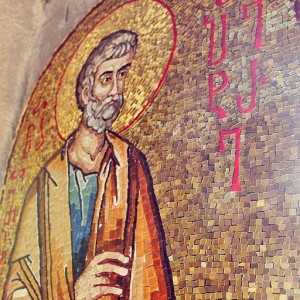 ὃν οὐκ ἰδόντες ἀγαπᾶτε, εἰς ὃν ἄρτι μὴ ὁρῶντες πιστεύοντες δὲ ἀγαλλιᾶσθε χαρᾷ ἀνεκλαλήτῳ καὶ δεδοξασμένῃ
ὃν οὐκ ἰδόντες ἀγαπᾶτε, εἰς ὃν ἄρτι μὴ ὁρῶντες πιστεύοντες δὲ ἀγαλλιᾶσθε χαρᾷ ἀνεκλαλήτῳ καὶ δεδοξασμένῃ
Translation:
whom you are loving although you have not seen him, in whom, although you are not seeing him now, yet you are believing.
You will be rejoicing greatly with inexpressible and glorified joy…
Some Grammatical, Lexical, and Syntactical Notes:
The syntax of the verse is difficult and the sources that I have consulted are generally not very helpful. I will provide my reading of the verse and my reasons for reading it like this.
1. ὃν οὐκ ἰδόντες ἀγαπᾶτε. The participle ἰδόντες is a concessive adverbial participle that modifies ἀγαπᾶτε (see participle handout under Greek resources). The negation by οὐκ is unusual. Participles are normally negated by μή. This could be for emphasis or simply be a lapse in grammar (see μὴ ὁρῶντες). The antecedent of the relative pronoun (ὃν) is Jesus Christ (1:7). Therefore, this relative clause modifies Jesus Christ.
2. εἰς ὃν ἄρτι μὴ ὁρῶντες πιστεύοντες δὲ. This second relative clause also modifies Jesus Christ. It stands in close parallelism to the preceding relative clause. The first clause is helpful for interpreting this one. The first participle here (ὁρῶντες) is another concessive participle, like ἰδόντες. The πιστεύοντες is probably a case of a periphrastic participle where the form of “to be” (ἐστε) is left out. We already saw a case of this in 1 Peter 1:7. As a result, the supplied ἐστε plus πιστεύοντες would be the verb of this clause, just like ἀγαπᾶτε was the verb of the previous clause. The prepositional phrase εἰς ὃν modifies πιστεύοντες, not ἀγαλλιᾶσθε, because it is so common for εἰς plus object to modify πιστεύω. Also, notice the nice parallelism between the relative clauses that results if the second relative clause ends after δέ. It is hard to make the syntax work here if one tries to make εἰς ὃν modify ἀγαλλιᾶσθε instead of πιστεύοντες.
Johnstone comes the closest to reading 1 Peter 1:8 as I do. He reasons, as I do, that εἰς ὃν belongs with πιστεύοντες. But then he goes on and tries to figure out how it could be related to ἀγαλλιᾶσθε as well (though he admits that this verb does not go with this preposition elsewhere) (Johnstone, First Epistle of Peter, 74). See also the four helpful options laid out by Forbes (Exegetical Guide to 1 Peter, 26). His second option is quite close to what I am proposing.
3. χαρᾷ. Dative of means that modifies ἀγαλλιᾶσθε.
4. It is quite strange that so many translations want to put an “and” in front of ἀγαλλιᾶσθε here. One is not necessary. Peter picks up here somewhat abruptly with what he started at v. 6 (ἐν ᾧ ἀγαλλιᾶσθε). Note that a period here would probably be more helpful and accurate than an “and.” See the punctuation in the Robinson-Pierpont Greek NT. It places a comma after the δέ.
Coming Up: Theological notes on 1 Peter 1:8
This post is part of a series of posts on 1 Peter. To read the other posts in the series, click here.
Note on sources: You can find Robert Johnstone’s commentary on 1 Peter (1888) at archive.org and download it for free.
Related Resources:
 Mark Dubis, 1 Peter: A Handbook on the Greek Text (Baylor Handbook of the Greek New Testament) |
 Greg Forbes, 1 Peter (Exegetical Guide to the Greek New Testament) |